The B&M Guide to Planning Christmas on a Budget
20 November 2019
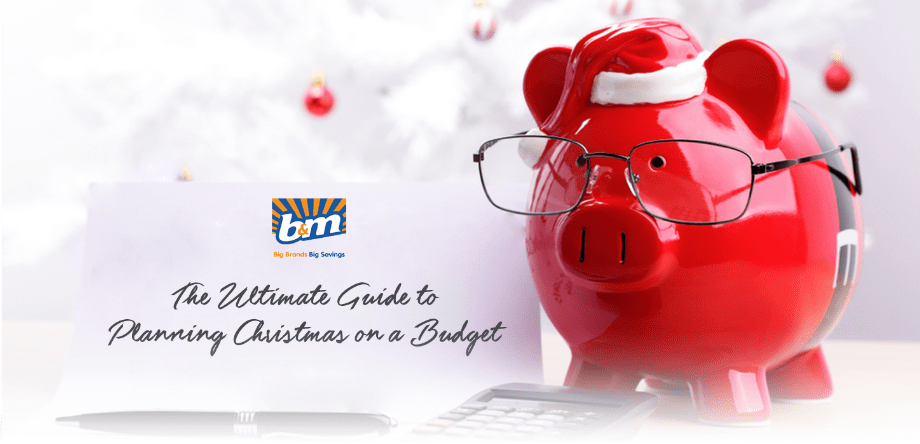
Christmas… It’s the most wonderful time of the year! But for many people, it can also be the most stressful - especially when it comes to money. With stats showing that a typical UK household spends an extra £500 in December compared to other months, Christmas can put a strain on your income.
So if you’re feeling a little worried about the impending costs of gifts, food and travel this Christmas, we’re here to put you at ease. We’ve developed the ultimate guide to planning Christmas on a budget. Brimming with helpful tips, affordable activities, and cheap recipes, we’re about to reveal how you can save your pennies this Christmas.
Budgeting Tips
How to Set Up Your Christmas Budget
If you want to stop overspending this Christmas, then it’s vital that you set yourself a budget and stick to it. Now that we’re on the countdown to Christmas, setting a monthly or weekly budget can be extremely beneficial.
1. Start by making a Christmas checklist. Write down all the people you absolutely need to buy for, and set yourself a reachable goal on a weekly basis.
Don’t forget to consider the cost of food, drinks, gifts and travel, and set a reasonable spending budget for each week.
We recommend that you spend 60% of your total budget of gifts, 25% on food and drinks, and the remaining 15% on travel.
2. Next, it’s important to determine how you want to split up these costs between your loved ones.
For example, say you’ve decided to spend £300 on gifts, you then need to determine budgets based on groups of people. It may be that you spend 50% of this total on gifts for your children, another 30% on gifts for close family and the final 20% on gifts for friends and extended family.
It may help if you put together a Christmas budget planner to help you remember everything you might need for this festive season.
Christmas Spending Statistics
In order to make this guide as useful as possible, we’ve spent a lot of time researching Christmas spending trends. Some of the statistics we’ve collected are very interesting, so we thought we’d share them with you.
Spend by region, generation and gender
According to Finder, the highest-spending generation at Christmas in the UK are Generation X - those aged between 40 and 54 years old. Gen X are estimated to spend £425 on Christmas gifts each year, followed by millenials at £417, with Baby Boomers coming in last place, spending an average of £351 each December.

The same study also found there to be a fairly large gap between male and female Brit’s average spend on Christmas gifts. The results show that men spend on average, £411 each year, whereas women spend £373.
Finally, the study identified the highest spending regions throughout the UK. Spending a whopping £536.29 on average per person, London comes in as the highest spending region. Northern Ireland came in at second place, spending £451.25, closely followed by Scotland who were found to spend an average of £417.77 per person.
What do we spend the most on at Christmas?
Another point of interest and the main inspiration for this guide is how much extra we tend to spend at Christmas. The infographic below demonstrates the added costs of food, alcohol, clothing, toiletries, computers, books and music and DVDs each Christmas.
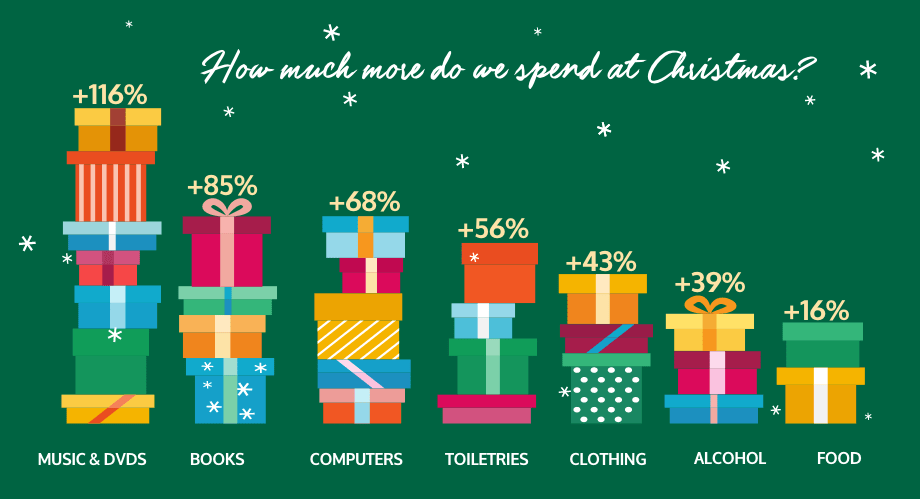
The study was carried out by the Bank of England, and the results are shocking. This study highlights how money spent on alcohol increases by 39%, toiletries by 56% and music & DVDs by a massive 116%.
How much more do we spend at Christmas?
A survey conducted by Statista last year asked respondents how much they were planning to spend in total on Christmas presents in 2018.
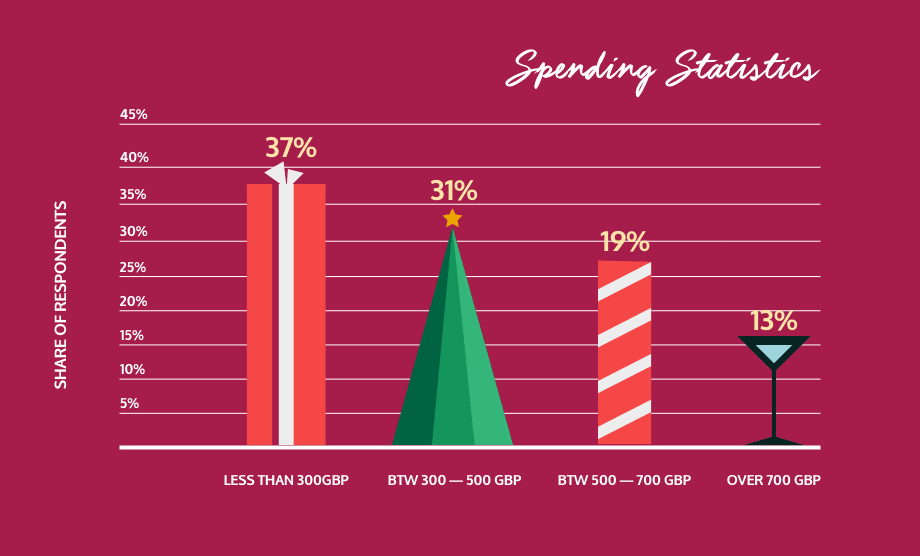
The results demonstrate that the majority of respondents (37%) were planning to spend less than £300, followed by 31% spending between £300 and £500. 19% of Brits predicted that they’d spend between £500 and £700 in total on Christmas gifts in 2018, and 13% admitted they’d be spending over £700.
Whilst we would like to agree that 37% of Brits send less than £300 in total on gifts each Christmas, by the time you’ve added on the costs of food, drink, travel, and other essentials, the total cost if often double this ‘planned’ cost, if not more.
This is part of the reason why we’ve put together this guide for you. We know how expensive the Christmas shop can be, so we’ve put together our best tips and tricks to help you out that little bit more.
Christmas Gifts

How to save money on gifts this Christmas
With stats showing that the average Brit spends £379 on Christmas gifts each year - that's £19.4 billion nationwide - it’ll come as no surprise that gifts are the main cause of financial burden around Christmas time.
But fret not… we’re here to share our best tips and tricks that’ll help you reduce costs this December.
Firstly, you need to determine your overall budget. For help with this, take a look at our budget planning guide above.
Being organised and planning ahead will also help with cost-cutting. A lot of shops have summer, mid-season and Christmas sales throughout August - December so you can find great gifts for cheaper throughout the year. Take a look in clearance aisles too - you’ll be surprised at what you can find for low prices.
And don’t forget to grab some Black Friday deals, to get major discounts on a variety of products.
One of the best ways to save money on gifts at Christmas is by taking part in a Secret Santa with larger groups of friends or work colleagues, rather than buying individually for each person.
Doing this will save you lots of money and time, and it can be great fun for everyone involved. Why not use this Secret Santa generator to get started.
If Secret Santa isn’t for you, you could consider setting a spending limit with close friends and family. This way, you’ll all be spending similar amounts, and you can set a reasonable goal. Everyone is in a similar position at Christmas, and agreeing on a spending limit can save a lot of money!
How to Find Cheap Christmas Gifts
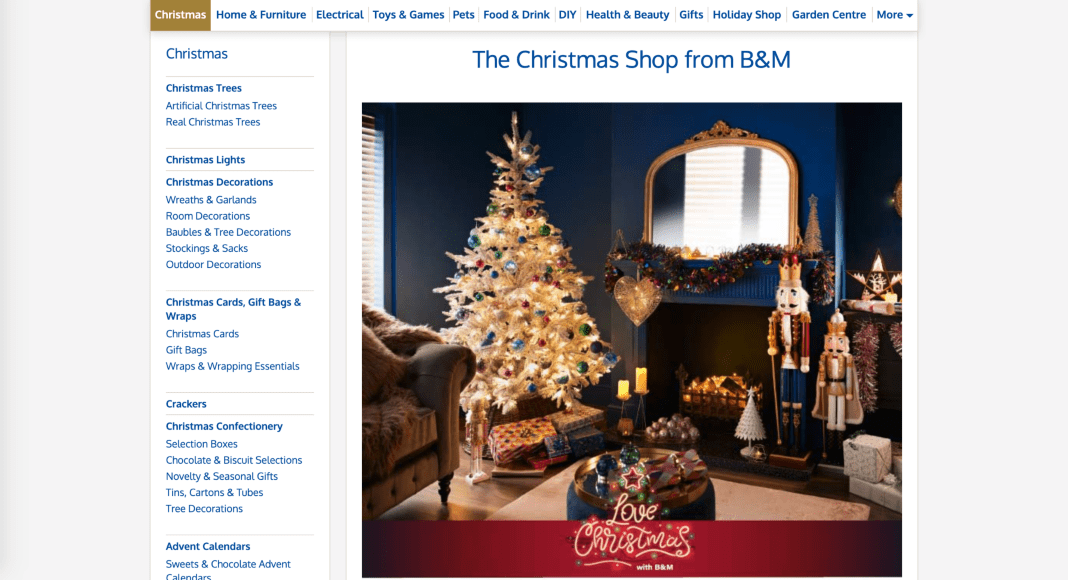
We know how difficult it can be to cut the costs at Christmas, especially where gifts are concerned. So here are our top tips for finding cheap Christmas gifts.
Remember, meaningful gifts don’t have to be expensive. Simply buying a photo frame and placing somebody’s favourite photo inside can be a lovely gesture. You could pair this with another small handmade gift, such as homemade cakes or cookies.
If you have more time on your hands, creating a scrap-book of photos can also be a lovely sentimental gift.
And don’t forget to request free samples where possible; they make great stocking fillers and can be wrapped up as smaller gifts.
Leading on from this, although stocking fillers generally tend to be cheap, we often get carried away and spend a lot of money on items we don’t necessarily need.
That’s why it’s important to include essentials (e.g. slippers, pyjamas, winter clothes, stationery) in your children’s presents as well as toys. This will save you money in the New Year.
Food and Cooking
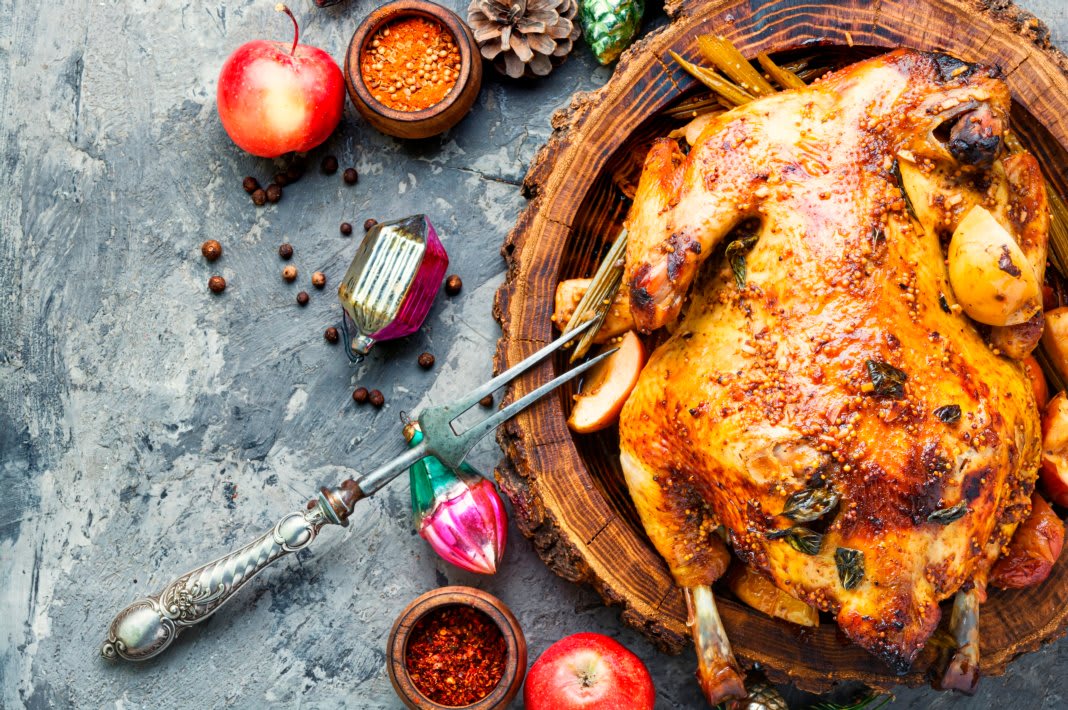
Cooking tips for a cheap Christmas
When it comes to food, it’s easy to overbuy - especially at Christmas. With more visits from friends and family than usual, it can be easy to overfill the fridge in December.
If this sounds like you, read on for some top tips on how you can reduce the costs of Christmas festive food this December.
Think about what is realistically going to get eaten on and around Christmas day. Do you really need to buy those expensive extra boxes of chocolates ‘just in case’? Probably not.
If you have time, recommended serving sizes are a great guide of how much food to buy for your Christmas dinner. Planning your meals in advance can also help with this.
Always remember to look at what’s on offer and substitute branded foods for cheaper products where you can. For example, substitute regular vegetables for the wonky vegetable ranges - they taste the same! And cut back on buying ‘premium’ products - the basics are just fine.
Again, don’t forget to take a look in the reduced aisles, you’ll be surprised at what you can find for extremely low prices. Even if you don’t want to use the food by its use-by date - which is usually the next day, - just freeze it and defrost when necessary!
Lastly, try not to waste food this Christmas. Instead of immediately throwing away uneaten food, wrap up food that can be eaten the following day, and store it in the fridge overnight.
Check out our 5 Delicious Christmas Dinner Leftover Recipes for inspiration.
Decorations & Homeware

Cheap Christmas Decorations Hacks
Buying new Christmas decorations each year can be tempting, but the cost can add up quickly. Below we’ve identified five main ways you can cut the costs of decorations and homeware this Christmas.
1. Get Creative
Instead of buying new Christmas decorations, give old and tired looking decorations a refresh with some paint and glitter glue. Getting out of the arts and crafts box can be fun for the whole family, and this will save you a ton of money!
Or why not make new decorations from scratch? Again. this will provide entertainment for your children and you and homemade decorations add a sentimental touch to your home.
2. Reuse Christmas Decorations
Re-use tinsel and other Christmas decorations instead of buying new every year.
3. Cut Down Tree Costs
Buy an artificial Christmas tree. Although the upfront cost of an artificial tree may seem like a lot, this will save you money in the long run as you can reuse an artificial tree for years to come.
Travel

Travel tips for a stress-free Christmas
Driving home for Christmas? We’ve put together our top travel tips for how you can have a stress-free Christmas this year.
Often people will visit more family and friends in December, than they do throughout the rest of the year. In fact, statistics show that the average brit will visit five relatives over the Christmas period - that’s 256 million nationwide!
The same study also found that the average Brit drives 92 miles delivering gifts each Christmas (4.7 billion nationwide), and 38 miles delivering Christmas cards (1.9 billion nationwide).
Try to save money on these trips by planning them in advance and arranging travel plans. For example, if you know you’ll be getting the train, try and book up to twelve weeks in advance for cheaper travel tickets.
Downloading money-saving travel apps will help you find exclusive discount codes and advice on the optimal times for booking transport, and with which companies.
Although this sounds obvious, try and walk where you can. When you’re posting Christmas cards for example, do you


